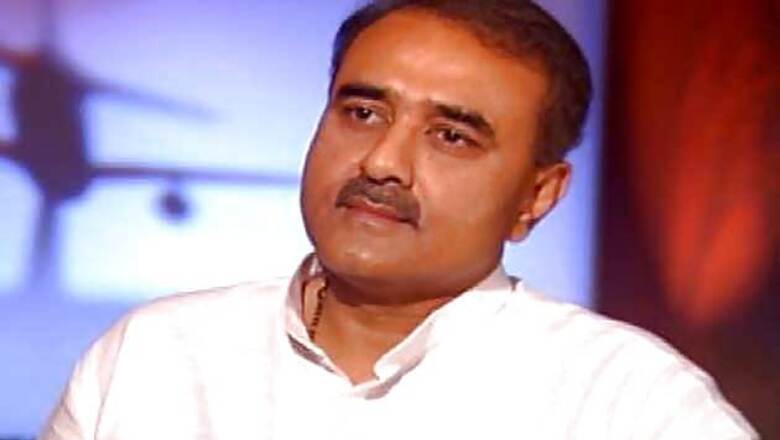
views
New Delhi: Union heavy industries minister Praful Patel is batting for the auto manufacturers on the diesel duty proposal. The Indian auto manufactures, specifically the diesel auto manufacturers, are concerned about an additional excise duty on diesel cars in Union Budget. Speaking to CNBC-TV18, Patel said dual diesel pricing is not feasible right now. "We have not pitched for hike in duty for diesel vehicles," he said adding, "diesel is an efficient fuel and we can't discourage its consumption."
This industry wide opposition comes especially in the wake of a slump in car sales this fiscal. Meanwhile, with just one-and-half months left to meet the Rs 40,000 crore disinvestment target for this fiscal, a panel of ministers recently okayed stake sale in ONGC in this fiscal. However, divestment in BHEL is expected anytime in FY13.
Clarifying his stance on the matter, Patel said, he is opposed to the timing and not the FPO itself. "The power sector perception in the stock markets is at the moment not very bright. All the scripts are taking beating at the stock exchanges and the second part is that BHEL also is not at the moment very well priced and we do not want to sell," he told the channel.
Below is an edited transcript of his interview with Shereen Bhan.
Q: The big worry as far as the Indian auto manufacturers, specifically the diesel auto manufacturers, are concerned is will the budget impose an additional excise duty on diesel cars. You had an inter ministerial group meeting which was not attended by the finance ministry as well as the oil ministry but a decision was taken not to impose additional excise duty on diesel vehicles?
A: No, I don't think there is any decision. Budgets are not discussed in advance but the fact is there is a thought process in the country that diesel is increasingly being used by the passenger car segment as a result of which people who shouldn't be subsidized with cheaper diesel are getting advantage of that.
The fact is that if you break up the consumption of diesel in the segment which we consider as people for whom diesel who shouldn't be subsidized, it won't amount to more than 5% of the diesel consumption because bulk of it is used for industry, for transportation, by the railways and so on. Even cars are using diesel; there are a lot of these Boleros which are in use in the villages. You can't really classify them as cars which do not need subsidy.
Q: So you are backing the auto manufacturers and Society of Indian Automobile Manufacturers (SIAM) which has been making pretty much the same pitch that the consumption is extremely low as far as diesel vehicles are concerned. Hence if you wanted to tax this, it would be counter-productive. You have actually proposed to the prime minister that there should be a hike in diesel prices as oppose to a hike in excise duty on diesel vehicles?
A: The industry, per se, has no problem with the price of diesel but there is an issue in our country in terms of the subsidies, which should be given to a particular segment, which is important. So, we can't do away with dual pricing immediately. It may be done over a period of time.
Q: But haven't you pitched for a higher hike in diesel price?
A: No. We haven't pitched for that. We are only saying that the industry needs clarity because diesel cars and SUVs are going to be increasingly more in production. All over the world, diesel is considered as a cleaner fuel and much more fuel efficient in terms of mileage. So it is the fuel of the future in terms of cars. Europe, which is actually the most environmentally assertive and conscious, is moving more towards diesel cars.
Q: Have you been able to convince your colleagues that they shouldn't hike excise on diesel vehicles?
A: That's what I want to say that I cannot prejudge what's coming in the budget. The fact is if every ministry and every sector has a wish list, one of them naturally will be that we shouldn't look at imposing higher tax on diesel vehicles because in the long run we will benefit more by way of lesser pollution, and more importantly, by way of fuel consumption.
We import fuel and it will mean that we get more mileage with lesser consumption of fuel. So it's a long term thing. In the short term, may be when the finance minister is really balancing his budget, I don't know which way he is going to look at it, I can't look into what he is going to be doing but the fact is that is the wish list which we have sent.
Q: What is the indication that you are getting - is it thinking at this point that one should actually revert back to pre-crisis levels in terms of excise and service tax because the Prime Minister's economic advisory council Mr. Rangarajan had said to go back to excise duties pre-crisis levels. Are we likely to see a hike in excise duty? Is that the indication that you are getting not just for diesel but across the board excise duty hike?
A: One thing is certain that while there is a case for dual pricing of diesel but it's not possible because of the practicalities involved. So the issue here is now if there is a hike in taxes for diesel vehicles, it has to be spelt out very clearly. It should be looked into the back drop of the auto sector because we have 2.5 million vehicles now, we want to work to 10 million vehicles by 2020, that's the automation plan which was launched and the fact is that when there is more production, it also leads to much more revenue for the government.
Q: But would I be right in saying that IMG actually bought your argument which is don't hike taxes on diesel cars?
A: That is the broad line of thinking.
Q: So the IMG did agree with your point of not hiking taxes on diesel cars?
A: I think it is the broad line and the approach which we have adopted.
Q: I now want to talk to about BHEL - what is the situation as far as the disinvestment is concerned? Are you opposed to the disinvestment whether an FPO or an auction or do you believe this is not the right timing and hence you are opposing it?
A: When the finance minister gave the last budget and wanted Rs 40,000 to be raised through disinvestment, BHEL was never really in the original list. In fact, we, as a ministry, proposed that why not divest 5% of BHEL? So it is not that there is any reason to say yes or no. In fact, we were the ones who proposed it.
Q: But you opposed it at the Empowered Group of Ministers meeting?
A: No, let's not put it as we opposed it. What we said is that the timing is not right because of the perception of the power sector in the stock markets at the moment is not very bright. All the scrips are taking a beating at the stock exchanges. Secondly, BHEL is not very well priced at the moment and we do not want to sell. There is no question of a distressed sale. In fact, this was only one of the ways to support the government initiative in raising more revenue. So it was one of those initiatives, which we were supporting because of the way the sector is behaving at the moment. We don't think it is the right time to off load it. There is no question of opposing it. We are the ones who proposed it so why should we oppose it?
Q: So if the market conditions were to change you would be putting BHEL back on the disinvestment mode?
A: Certainly. In fact, that is the thought process and BHEL is a very strong company. Under the current circumstances, the perception of the sector, being what it is, we have to be little cautious.
Q: Were you waiting then for the imposition of the import duty to come in to effect before you actually take BHEL to the market whether an FPO or an auction, this has been the big speculation. The Maira Committee Report recommended 14%, we understand that the government is now looking at 19%. This is the move that will clearly protect BHEL and Larsen and Turbo?
A: No. I think it has to be understood in the perspective that it is not a question of protectionism.Every country would look at its own industry. We, in India, did not have capabilities to match our plan requirement for the power sector. We were looking at 100,000 megawatts in the 11th plan, almost a similar capacity in the 12th plan. Our own manufacturing capability was not more than 25,000-30,000 MW so there was no question of looking at it that way.
Today, with so much of investment being made internally, we have the ability now to produce machines to the extent of almost 100,000 MW between BHEL and L&T and the others which have to come, why should we not promote the domestic industry? It is not a question of protectionism.

















Comments
0 comment